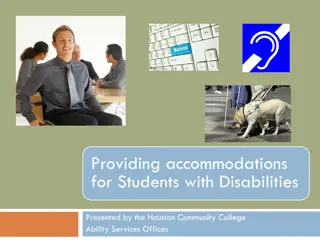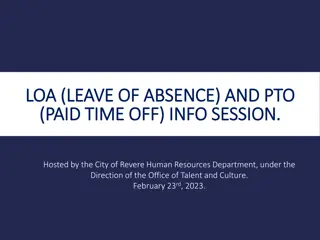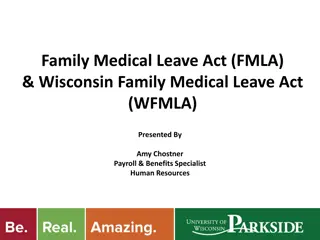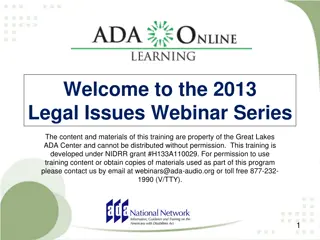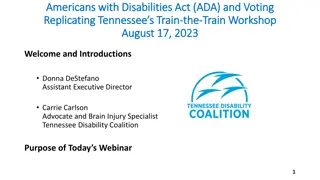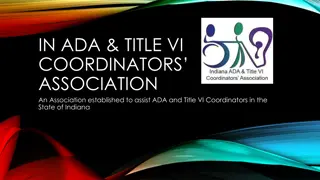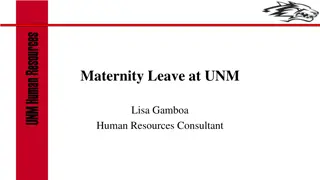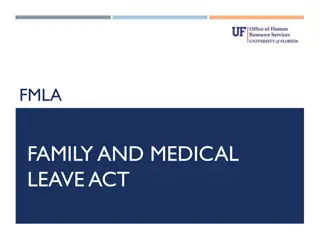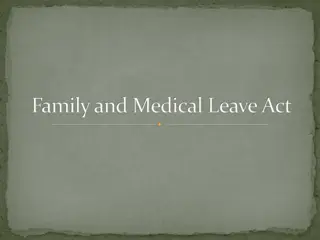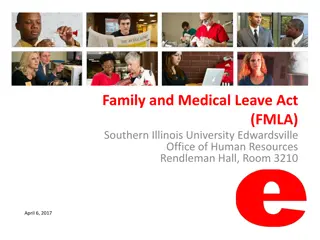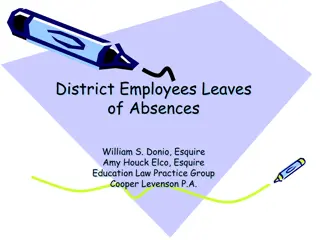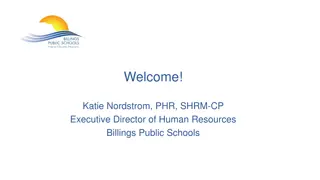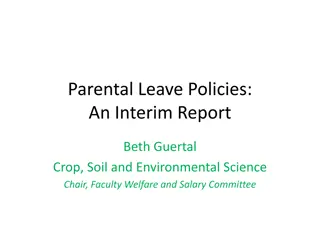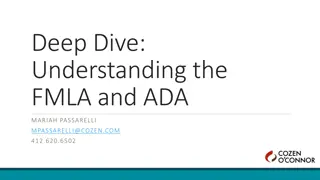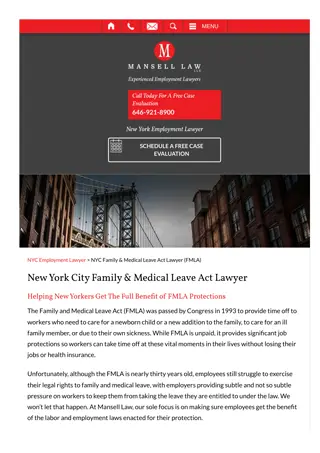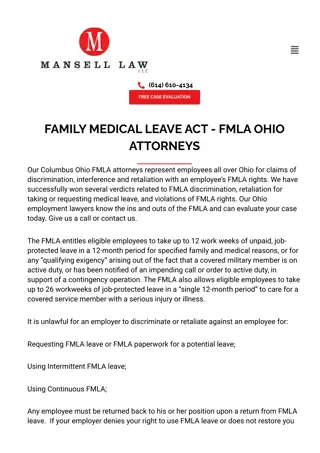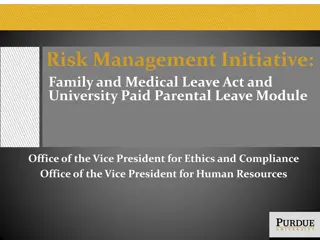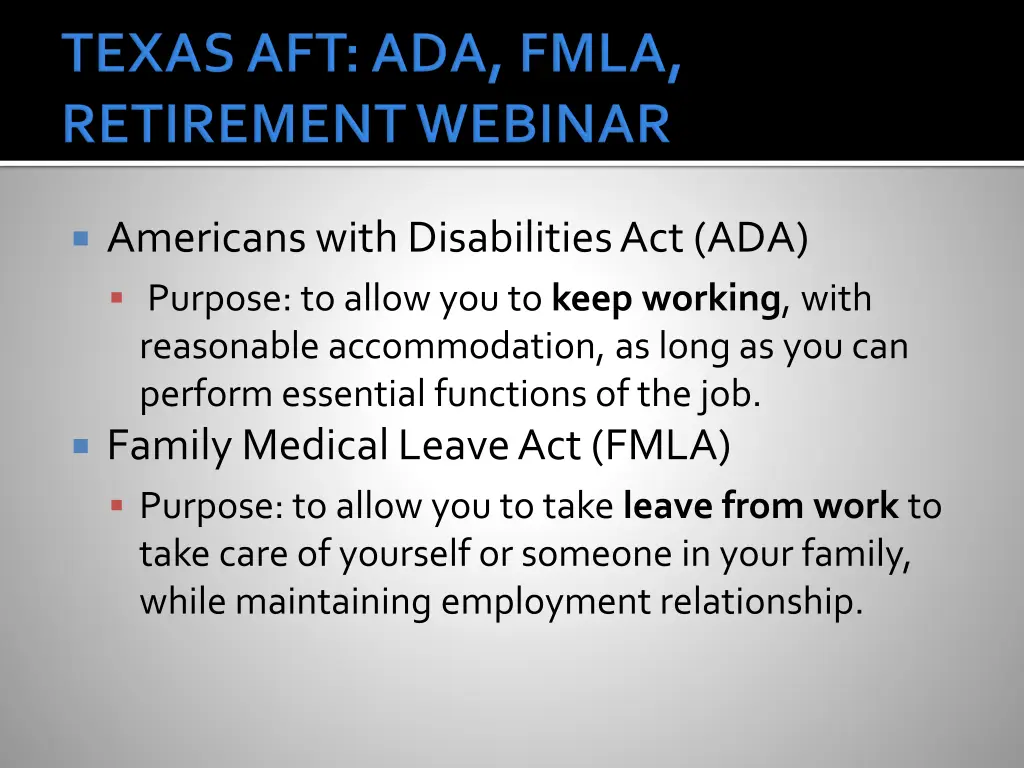
Understanding Americans with Disabilities Act (ADA) and Family Medical Leave Act (FMLA)
Learn about the Americans with Disabilities Act (ADA), which aims to support individuals with disabilities in the workplace, and the Family Medical Leave Act (FMLA), which allows employees to take leave for health-related reasons while preserving their job status. Explore how these acts prohibit discrimination, address accommodations for disabilities, and consider pre-existing medical conditions, especially in the context of the COVID-19 pandemic.
Download Presentation

Please find below an Image/Link to download the presentation.
The content on the website is provided AS IS for your information and personal use only. It may not be sold, licensed, or shared on other websites without obtaining consent from the author. If you encounter any issues during the download, it is possible that the publisher has removed the file from their server.
You are allowed to download the files provided on this website for personal or commercial use, subject to the condition that they are used lawfully. All files are the property of their respective owners.
The content on the website is provided AS IS for your information and personal use only. It may not be sold, licensed, or shared on other websites without obtaining consent from the author.
E N D
Presentation Transcript
Americans with Disabilities Act (ADA) Purpose: to allow you to keep working, with reasonable accommodation, as long as you can perform essential functions of the job. Family Medical Leave Act (FMLA) Purpose: to allow you to take leave from work to take care of yourself or someone in your family, while maintaining employment relationship.
Prohibits discrimination on the basis of disability. Disability: physical or mental impairment that substantially limits one or more major life activities, a record of impairment, or if person is perceived to have impairment. Employee must be able to perform essential duties of job, with or without accommodation. District must make reasonable accommodation change in work environment that allows employee with a disability to perform essential functions. But, district not required to make accommodation if it would pose an undue hardship on district.
Significant burden or expense. Nature and cost of accommodation. Resources available to school district. Operation of campus and district.
Pre-existing physical or mental conditions. May not have needed accommodations until COVID-19 pandemic occurred or accommodations may need to be altered. CDC has identified certain underlying conditions that put individuals at higher risk for severe illness due to COVID-19.
Chronic kidney disease COPD (chronic obstructive pulmonary disease) Immunocompromised state (weakened immune system) from solid organ transplant Obesity (body mass index [BMI] of 30 or higher) Serious heart conditions, such as heart failure, coronary artery disease, or cardiomyopathies Sickle cell disease Type 2 diabetes mellitus Source: https://www.cdc.gov/coronavirus/2019-ncov/need- extra-precautions/people-with-medical-conditions.html?
Asthma (moderate-to-severe) Cerebrovasculardisease (affects blood vessels and blood supply to the brain) Cystic fibrosis Hypertension or high blood pressure Immunocompromisedstate (weakened immune system) from blood or bone marrow transplant, immune deficiencies, HIV, use of corticosteroids, or use of other immune weakening medicines Neurologic conditions, such as dementia Liver disease Pregnancy Pulmonary fibrosis (having damaged or scarred lung tissues) Smoking Thalassemia(a type of blood disorder) Type 1 diabetes mellitus Source: https://www.cdc.gov/coronavirus/2019-ncov/need-extra- precautions/people-with-medical-conditions.html?
CDC: Persons over 65 are at higher risk for severe COVID- 19 if they contract disease. But being over 65 (or any particular age) is not a disabling condition, in and of itself. CDC has encouraged employers to offer maximum flexibilities to this group. To strengthen accommodation request, should couple with underlying medical condition, if applicable. Age Discrimination in Employment Act (ADEA) prohibits an employer from excluding someone from workplace based on his or her being 65 or older. ADEA would not prohibit a district from offering flexibility to 65+ group, even if younger workers (40-64) treated less favorably.
Temporary job restructuring, such as telework. Removal of marginal, not essential, duties, such as hall duty. Additional PPE. Modified shift schedules. Changes to work environment, such as plexiglassbarriers to maintain distancing.
Must inform district of disability and request accommodation. District allowed to ask questions or request medical documentation. (Employer must keep information confidential). Possible questions: how disability creates a limitation, how the request will affect limitation, whether another accommodation would work, whether proposed accommodation would enable employee to perform essential functions.
I have Type 2 diabetes. CDC guidelines indicate that due to this condition, I am at higher risk for severe illness and complications, including death, if I get COVID-19. Under the ADA, I am requesting an accommodation that will allow me to teach remotely, which will allow me to perform the essential duties of my job without unnecessary exposure to COVID-19. Please let me know what I need to provide in order for this accommodation to be granted. Please keep this request confidential.
I have Type 2 diabetes. CDC guidelines indicate that due to this condition, I am at higher risk for severe illness and complications, including death, if I get COVID-19. Under the ADA, I am requesting an accommodation that will allow me to teach remotely, which will allow me to perform the essential duties of my job without unnecessary exposure to COVID-19. Please let me know what I need to provide in order for this accommodation to be granted. Please keep this request confidential. I am attaching documentation from my doctor regarding my underlying condition, as well as her recommendation that this accommodation be made. I provided a copy of my job description to my doctor.
BASIC BETTER I have Type 2 diabetes. CDC guidelines indicate that due to this condition, I am at higher risk for severe illness and complications, including death, if I get COVID-19. Under the ADA, I am requesting an accommodation that will allow me to teach remotely, which will allow me to perform the essential duties of my job without unnecessary exposure to COVID- 19. Please let me know what I need to provide in order for this accommodation to be granted. Please keep this request confidential. I am attaching documentation from my doctor regarding my underlying condition, as well as her recommendation that this accommodation be made. I provided a copy of my job description to my doctor. I have Type 2 diabetes. CDC guidelines indicate that due to this condition, I am at higher risk for severe illness and complications, including death, if I get COVID-19. Under the ADA, I am requesting an accommodation that will allow me to teach remotely, which will allow me to perform the essential duties of my job without unnecessary exposure to COVID-19. Please let me know what I need to provide in order for this accommodation to be granted. Please keep this request confidential.
The FMLA entitles school district employees to take unpaid, job-protected leave for specified family and medical reasons, including reasons related to COVID- 19. Must have worked for district at least 1250 hours during the 12 month period immediately preceding the leave. Eligible employees may take up to 12 workweeks of leave in a 12-month period for a serious health condition that makes the employee unable to perform the essential functions of his or her job or to care for a spouse, son, daughter, or parent who has a serious health condition.
The FFCRA temporarily expanded FMLA to allow an employee to take FMLA leave, and to receive partial pay for doing so, if the employee must care for a child whose school has been closed for a COVID-19 related reason. Expansion for this reason is temporary, until December 31, 2020. It allows employees to take FMLA leave if the employee is unable to work or telework due to a need for leave to take care of the employee s child if the school or place of care has been closed, or if the child care provider for the child is unavailable, due to a public health emergency. The first 10 days (2 weeks) of leave may be unpaid, except that an employee may choose to use the new emergency sick leave or any other accrued paid leave. The remaining 10 weeks of FMLA leave provided by this law will be paid at 2/3rds of the employee s regular rate, up to a maximum payment of $200 per day ($10,000 total).
No. Except for the special, temporary child care addition, FMLA is unpaid leave but you may be required or allowed to take accrued sick or personal leave concurrently.
Contact your districts HR department to request FMLA leave. You must comply with the district s usual requirements for requesting leave. The District will have forms for you to take to your doctor.
When an employee requests FMLA leave due to his or her own serious health condition or a covered family member s serious health condition, the district may require certification in support of the leave from a health care provider. The district may also require second or third medical opinions, at the district s expense, and periodic recertification of a serious health condition.
The school district is obligated to continue group health coverage during this leave on the same terms as if you continued to work. Generally, you must also continue to make your normal contributions.
Yes. You cannot be fired, disciplined or otherwise discriminated against because you took FMLA. Additionally, you must be provided with the same or nearly equivalent job upon your return from these leaves. However, this is not total job protection under any circumstances. If the school district can demonstrate that it would have taken some employment action against you, such as a lay-off or non-renewal, regardless of whether you took the leave, it can still take that particular action against you.
ADA: - Must file an administrative charge with state Texas Workforce Commission (TWC) or federal EEOC. - Strict deadlines: must file charge within 180 days under state law or 300 days under federal law. - To fully preserve legal options, meet 180 day deadline. FMLA: - Must file lawsuit within 2 years GRIEVANCES: - Must meet local school district deadline. - Exhausting local procedures does NOTtoll deadline for filing administrative charge or lawsuit.




